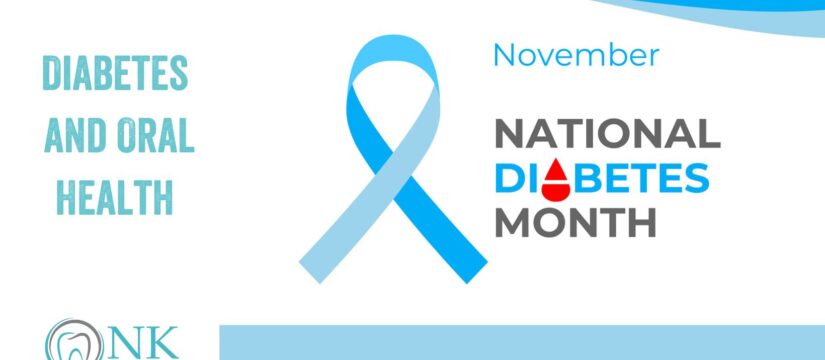
If you are among the more than 37 million Americans living with diabetes, you already know the risk for medical complications in such areas as your heart, kidneys, eyes and skin. But did you also know that diabetes can affect your oral health? According to the American Diabetes Association, diabetes and oral health complications are connected in ways that you may not expect. As November is National Diabetes Awareness Month, we dedicate this blog post to provide information that we hope will help you manage your diabetes by building your healthcare team — which should include your dentist.
Why People with Diabetes are More Likely to Develop Oral Health Problems
The link between diabetes and oral health problems is high blood sugar. As Cleveland Clinic explains, “If blood sugar is poorly controlled, oral health problems are more likely to develop. This is because uncontrolled diabetes weakens white blood cells, which are the body’s main defense against bacterial infections that can occur in the mouth.”
In turn, according to the National Institute of Dental and Craniofacial Research (NIDCR), having gum disease may make your blood sugar harder to control — setting up a vicious cycle. Controlling blood sugar levels is crucial to reducing the risk of developing oral health problems.
Oral Health Problems Associated with Diabetes
There are several oral health problems that can be prompted by diabetes. The following are provided courtesy of Cleveland Clinic, MouthHealthy — a consumer education website presented by the American Dental Association (ADA), and the National Institute of Diabetes and Digestive and Kidney Diseases (NIDDK). As you will learn, many are interrelated.
Periodontal disease — Periodontal (gum) disease is an infection of the tissues that hold your teeth in place. Left untreated, it leads to tooth loss and erosion of supporting bone structures. This is the most common dental disease affecting those living with diabetes (nearly 22% of those diagnosed). Especially with increasing age, poor blood sugar control increases the risk for gum problems.
Besides weakening white blood cells, another complication of diabetes is that it causes blood vessels to thicken. This slows the flow of nutrients to and waste products from body tissues, including the mouth — which results in the body losing its ability to fight infections.
As with all infections, serious gum disease may cause blood sugar to rise. This makes diabetes harder to control because you are more susceptible to infections and are less able to fight the bacteria invading the gums.
Tooth decay — High levels of sugar in your blood can also cause it to build up in your saliva. This sugar can feed harmful bacteria that combine with food to form a soft, sticky film called plaque, which causes cavities. If you don’t remove plaque, it can also build up on your teeth near your gum line and harden into a deposit called tartar, which can cause gum disease.
Dry mouth — Poorly controlled diabetes can decrease saliva flow, resulting in dry mouth. This condition can further lead to soreness, ulcers, infections and tooth decay.
Thrush — This fungal infection of the mouth is common in people with diabetes who frequently take antibiotics to fight various infections. The fungus thrives on the high glucose (sugar) levels in the saliva of those whose diabetes is poorly controlled. A burning sensation in your mouth or on your tongue can be symptoms of thrush.
Longer healing time — People with poorly controlled diabetes do not heal quickly after oral surgery or other dental procedures because blood flow to the treatment site can be damaged.
Put Your Dentist on Your Healthcare Team
Tell your dentist that you have diabetes — or prediabetes. Even if you’re an established patient and haven’t mentioned it before because you didn’t think it was important, don’t feel awkward about doing so during your next visit. This is essential information for your dentist in order to provide appropriate screenings and treatment. Also let your dentist know what medications or insulins you take to control it.
This conversation also should include steps you can take to prevent diabetes-related oral complications, as well as how to identify the warning signs of their early stages.
While scheduling regular dental check-ups and cleanings is the first line of defense in good oral care, it is especially crucial for those with diabetes. In fact, practicing good oral hygiene and having professional deep cleanings done by your dentist can help to lower your HbA1c. Our blog post – “Deep Teeth Cleaning: Everything You Need to Know” – covers this topic in detail.
As we always say, oral health is part of overall health! Our team of experienced, dedicated dental professionals will help address your oral health concerns, and determine the best solution for you based on your individual situation. We strive to identify treatment options that fit your needs.
We understand that the main concern you may have is cost, which is why we accept all major PPO plans for dental insurance and also offer our in-house dental plan. Please see our financing page for more information.
At NK Family Dental, it is our mission to provide the highest quality and most compassionate oral care to our Chicago patients, including both dental and periodontal services. Our practice is trusted for advanced oral surgery procedures and comfortable root canal treatment.
Our dental specialists include our general dentist, Dr. Nilofer Khan, our endodontist, Dr. Sabek, and our periodontist, Dr. Amir Danesh. Dr. Danesh is a board-certified periodontist and Diplomat of the American Board of Periodontology. He has contributed to the publication of two books, as well as published over 20 papers in prestigious dental research journals.
We serve the neighborhoods of Logan Square, Bucktown, Humboldt Park, and Wicker Park with the dedication that’s earned us the reputation as the Best Dentist in Chicago!
Schedule your visit through ZocDoc, or contact us directly. We look forward to treating you soon!
